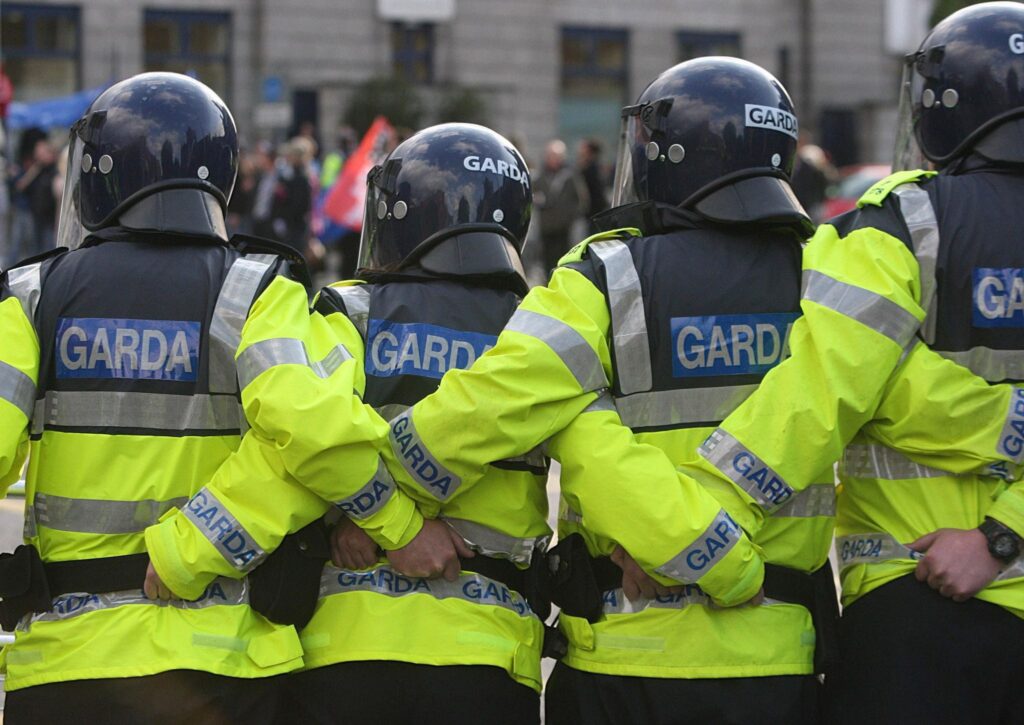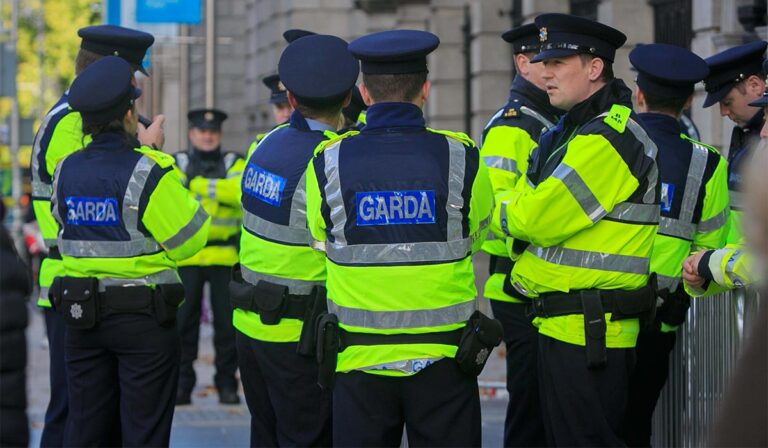The Irish police force is known as An Garda Síochana, which translates to “the Guardians of the Peace” in English. The term “Garda” comes from the Irish language, and “Síochána” means “of the peace.”
The force was established in 1922, shortly after the foundation of the Irish Free State. The name was chosen to reflect its mission of ensuring peace and security within the country. The use of the Irish language in the name of the police force is also symbolic of Ireland’s cultural heritage and the importance of the Irish language in the country.
How was An Garda Síochána established in Ireland?
The establishment of An Garda Síochána was a pivotal moment in Irish history, reflecting a shift towards an independent state and the creation of a culturally rooted, community-oriented police force committed to upholding law, order, and peace within the country.
Establishment of An Garda Siochana
The establishment of An Garda Síochána marked a crucial transition in Ireland’s law enforcement history:
Transitional Period

After the establishment of the Irish Free State in 1922, there was an immediate need to replace the Royal Irish Constabulary (RIC), which was associated with British colonial rule. Disbanding the RIC led to a void in law enforcement, necessitating the formation of a new police force.
Creation of a Civilian Police Force
On August 22, 1922, Michael Collins and the provisional government took steps to establish An Garda Síochána. The aim was to create a new, non-military, and civilian police force that would serve the newly formed Irish state and its citizens.
Recruitment and Training
The early years of An Garda Síochána involved recruitment drives to form the initial ranks of the force. Officers underwent training to enforce the law, maintain order, and uphold the principles of justice within the country.
Formation of the Police Force After the Foundation of the Irish Free State
National Identity
The establishment of an independent Irish state necessitated the creation of an indigenous police force distinct from the RIC associated with British rule. An Garda Síochána aimed to represent Irish sovereignty and cultural identity.
Community-Oriented Policing
The new police force sought to adopt a more community-focused approach compared to the RIC, emphasizing cooperation with and support for local communities. This approach aimed to build trust and rapport between law enforcement and the populace.
Political Transition
The transition to an independent Irish state involved political upheavals and changes in governance. The formation of a new police force was integral to establishing state authority and ensuring law and order in the country.
Political and Societal Factors Influencing the Choice of the Name
The selection of the name “An Garda Síochána” was influenced by various factors:
Cultural Significance
The choice of an Irish name reflected a deliberate effort to promote Irish culture and language, symbolizing a break from Ireland’s colonial past and asserting its distinct national identity.
Symbolism of “Guardianship”
“Garda” translates to “guardian” in English, emphasizing the protective role of the police force. This name choice aimed to portray the police as guardians or protectors of the community.
Emphasis on Peacekeeping
“Síochána,” meaning “of the peace,” underscored the force’s primary mission of maintaining peace, order, and stability within Irish society.
What does ‘Garda Síochána’ mean and its significance in law enforcement?
The term “Garda” within “Garda Síochána” encapsulates the broader philosophy and approach to law enforcement in Ireland, emphasizing the role of the police as guardians of the peace, committed to serving and protecting the community while fostering positive relationships and mutual trust.
Translation of “Garda Síochána” to English
“Garda Síochána” translates directly from Irish to English as “Guardians of the Peace.”
“Garda” signifies “guardian” or “guard” in English, representing the protective and watchful role of the police force.
“Síochána” translates to “of the peace,” emphasizing the primary mission of maintaining peace, order, and tranquility within the community.
Interpretation of the term “Garda” in the context of law enforcement
The term “Garda” embodies the proactive, protective, and community-focused nature of law enforcement.
It signifies the role of the police as guardians or protectors of the community, responsible for safeguarding the well-being and safety of the citizens.
Unlike terms commonly associated with law enforcement that might emphasize authority or control, “Garda” conveys a sense of duty, service, and guardianship, fostering a positive and approachable image of the police among the public.
The term implies a more supportive and community-oriented policing approach, emphasizing the idea that law enforcement is not just about enforcing laws but also about actively protecting and supporting the community’s welfare and peace.
Furthermore, “Garda” reflects the ethos of a civilian police force working hand-in-hand with the community, promoting cooperation and trust rather than an adversarial relationship.
Why is the use of the Irish language significant in the name of the Irish police force?

The name “An Garda Síochána” and its underlying meaning as “Guardians of the Peace” signify not just a law enforcement agency but a dedicated body committed to preserving Irish cultural heritage, promoting peace, and fostering a strong bond between law enforcement and the communities they serve.
Symbolic significance of using the Irish language in the name
Preservation of Cultural Identity
Choosing the Irish language for the name “An Garda Síochána” was symbolic of Ireland’s cultural heritage and a deliberate effort to promote and preserve the Irish language within the fabric of the newly formed nation.
Assertion of Independence
Using Irish reflected a break from the colonial past and symbolized Ireland’s independence from British rule. It emphasized the nation’s sovereignty and distinct cultural identity, reaffirming Irish values and traditions.
Cultural Pride and Nationalism
The use of the Irish language in the name fostered a sense of cultural pride and nationalism among the Irish populace. It connected the police force to the cultural roots and historical traditions of the nation, enhancing its legitimacy and acceptance among the people.
Promoting Linguistic Diversity
It underscored the importance of linguistic diversity within Ireland, showcasing the significance of the Irish language alongside English as an essential part of the country’s identity.
Mission and objectives reflected in the name “Guardians of the Peace”
Commitment to Peacekeeping
The term “Guardians of the Peace” encapsulates the primary mission of An Garda Síochána, emphasizing the force’s dedication to maintaining peace, order, and tranquility within Irish society.
Community-Centric Policing
It reflects the commitment of the police force to a community-centric approach, focusing not only on law enforcement but also on being proactive protectors and guardians of the community’s well-being.
Emphasis on Service and Protection
The term “Guardians” implies a duty to protect and serve the public, prioritizing the welfare and safety of the citizens as a fundamental objective.
Building Trust and Collaboration
By portraying the police as “Guardians of the Peace,” the name fosters trust, cooperation, and positive relationships between law enforcement and the community. It emphasizes the importance of collaborative efforts between the police and the public in maintaining a peaceful and secure society.
FAQ’s
Why are gardaí called shades?
Gardaí were sometimes informally referred to as “shades” in the past due to the dark-colored uniforms they wore, which resembled shades or shadows.
What is a female Garda called?
A female Garda in Ireland is called a “Garda” just like their male counterparts. There’s no gender-specific title; both men and women in the force are referred to as Gardaí.
Do police carry guns in Ireland?
Generally, the majority of Irish police (Gardaí) do not routinely carry firearms. However, there are armed units within the force for specific situations that may require the use of firearms.
What countries call police Garda?
The term “Garda” is specifically used to refer to the police force in Ireland (An Garda Síochána). No other country officially uses this term to refer to their police force.
What is a Garda salary?
A Garda’s salary in Ireland can vary depending on rank and experience. Generally, it starts around €30,000-€40,000 per year for a probationary Garda and increases with experience and rank.
How do I become a Garda in Ireland?
To become a Garda in Ireland, one needs to meet specific eligibility criteria, pass aptitude tests, physical assessments, an interview, and complete training at the Garda College. This process is overseen by the Public Appointments Service in Ireland.
Final Words
In conclusion, An Garda Síochána, the Irish police force, was formed after Ireland gained independence in 1922. Its creation aimed to replace the Royal Irish Constabulary and establish a civilian police force for the new Irish Free State. Choosing the name “An Garda Síochána,” meaning “Guardians of the Peace” in Irish, was important. It showed a break from the past, emphasizing Irish cultural identity and the force’s role as protectors of the community.
Furthermore, this police force was not just about enforcing laws but also focused on supporting and safeguarding the people, working closely with communities to maintain peace and security. Overall, An Garda Síochána stands as a symbol of Ireland’s independence, cultural pride, and commitment to serving and protecting its citizens.

